In this example, I have an array of four elements. I have declared a pointer to integer which contains the address of array. Then i have displayed the address of 0th index in 3 different ways. Similarly, the address of 1st index is displayed in 3 different ways. When I output this (&pNumbers)+0 its pretty understandable that a unique and different address would be displayed. In next line, *(&pNumbers+0) displays the 0th index address (as its contain by the pointer). Now the problem part comes. On outputting this (&pNumbers)+1 line it displays the array 0th index again. Why ?
first question: when i retrieve the pointers address (&pNumbers), it displays new and unique address. But when i add up in that address. How is it accessing the array's element addresses? e.g
enter code here
cout<<" (&pNumbers)+1 "<<(&pNumbers)+1<<endl // new address + 1 but showing address of 0 element.
cout<<" (&pNumbers + 2) "<<(&pNumbers+2)<<endl // showing address of of 1st index
second question: If say it does somehow points to the corresponding array elements. On my dereferencing why it is not displaying the correct data value corresponding to array elements. e.g
enter code here
cout<<" *(&pNumbers+1) "<< *(&pNumbers+1) // assumption was 31 (but displaying some 0x1f)
cout<<" *(&pNumbers + 2) "<<*(&pNumbers+2)<<endl // assumption was 28 (but displpaying 0x1c)
Below is the source code:
#include <iostream>
#include <string>
#include <conio.h>
using namespace std;
int main()
{int number[] = { 31, 28, 31, 30};
int *pNumbers = number;
cout<<" Address of number[0] "<<number<<endl;
cout<<" Address of number[1] "<<number+1<<endl;
cout<<" Address of number[2] "<<number+2<<endl;
cout<<" Address of number[3] "<<number+3<<endl<<endl;
cout<<" Address of &pNumbers "<< &pNumbers<<endl<<endl; // address of pNumbers
cout<<" Address of number "<< number<<endl; // address of array's first element
cout<<" pNumber Address "<< pNumbers<<endl;
cout<<" &(pNumbers[0]) "<< &(pNumbers[0])<<endl<<endl;
cout << " pNumbers+1: " << pNumbers+1<<endl; //address of array's second element
cout<<" (&pNumbers[1]) "<<(&pNumbers[1])<<endl; //
cout<<" (pNumbers+1) "<< (pNumbers+1) <<endl<<endl;
cout<<" (&pNumbers)+0 "<< (&pNumbers)+0<<endl;
cout<<" *(&pNumbers+0) "<< *(&pNumbers+0)<<endl<<endl;
cout<<" (&pNumbers)+1 "<<(&pNumbers)+1<<endl<<endl; // new address + 1 expected but displaying array's 0th index address why ?
cout<<" *(&pNumbers+1) "<<*(&pNumbers+1)<<endl<<endl;
cout<<" (&pNumbers + 2) "<<(&pNumbers+2)<<endl<<endl;
cout<<" *(&pNumbers + 2) "<<*(&pNumbers+2)<<endl<<endl;
cout<<" (&pNumbers + 3) "<<(&pNumbers+3)<<endl<<endl;
cout<<" *(&pNumbers + 3) "<<*(&pNumbers+3)<<endl<<endl;
cout<<" (&pNumbers + 4) "<<(&pNumbers+4)<<endl<<endl;
cout<<" *(&pNumbers + 4) "<<*(&pNumbers+4)<<endl<<endl;
return 0;
}
